Looking for the best herbal tea blend to support your respiratory health? You'll want a mix that includes powerful ingredients like mullein leaf, licorice root, thyme, eucalyptus, and peppermint. These herbs work together to soothe respiratory tissues, reduce inflammation, loosen mucus, and clear airways. For maximum benefits, brew your tea using hot water and steep for 5-7 minutes. Aim to drink 2-3 cups daily, adjusting the ratios to suit your taste. Remember to store your blend in an airtight container away from sunlight to preserve its potency. By diving deeper, you'll discover even more ways to enhance your respiratory wellness through herbal teas.
Understanding Respiratory Health
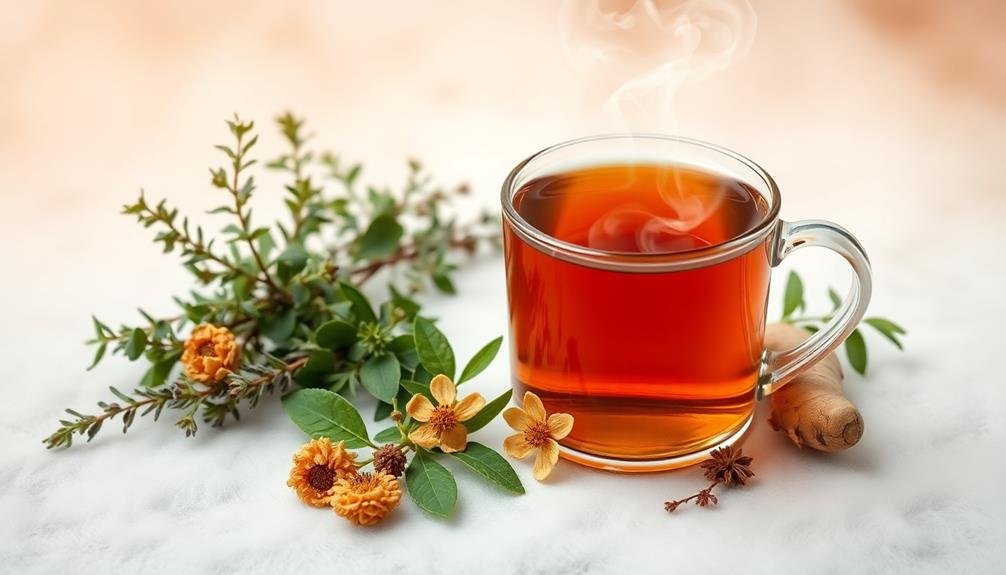
Three key components of respiratory health are lung capacity, airway function, and the body's ability to fight off infections. Your lungs' capacity determines how much oxygen you can take in and carbon dioxide you can expel. Maintaining good lung capacity helps you breathe easier and supports overall health.
Airway function refers to how well your respiratory system moves air in and out. This includes the health of your nasal passages, throat, and bronchial tubes. Clear, unobstructed airways guarantee efficient breathing and reduce the risk of respiratory issues.
Your immune system plays an essential role in protecting your respiratory tract from harmful pathogens. A strong immune response can prevent or quickly resolve infections that might otherwise lead to more serious respiratory problems.
To support these components, you should avoid smoking, exercise regularly, practice deep breathing exercises, and maintain a healthy diet.
Additionally, staying hydrated, managing stress, and getting enough sleep can all contribute to better respiratory health. By focusing on these areas, you'll improve your overall lung function and reduce your risk of respiratory issues.
Key Ingredients for Lung Support
Building on our understanding of respiratory health, let's explore specific ingredients that can support your lungs.
Mullein leaf stands out as a powerful herb, known for its ability to soothe irritated respiratory tissues and reduce inflammation. It's often used to address coughs and bronchitis.
Licorice root is another key ingredient, offering anti-inflammatory and expectorant properties. It can help loosen and expel mucus, making breathing easier.
Thyme, rich in thymol, acts as a natural expectorant and antimicrobial agent, potentially easing respiratory infections.
Eucalyptus leaves contain cineole, a compound that can help clear airways and reduce inflammation. It's particularly effective for relieving congestion and sinus pressure.
Peppermint leaves, with their menthol content, can provide a cooling sensation that helps open airways and ease breathing difficulties.
Ginger root is valued for its anti-inflammatory properties and ability to boost immune function. It may help fight respiratory infections and reduce airway inflammation.
Preparing Your Herbal Tea Blend
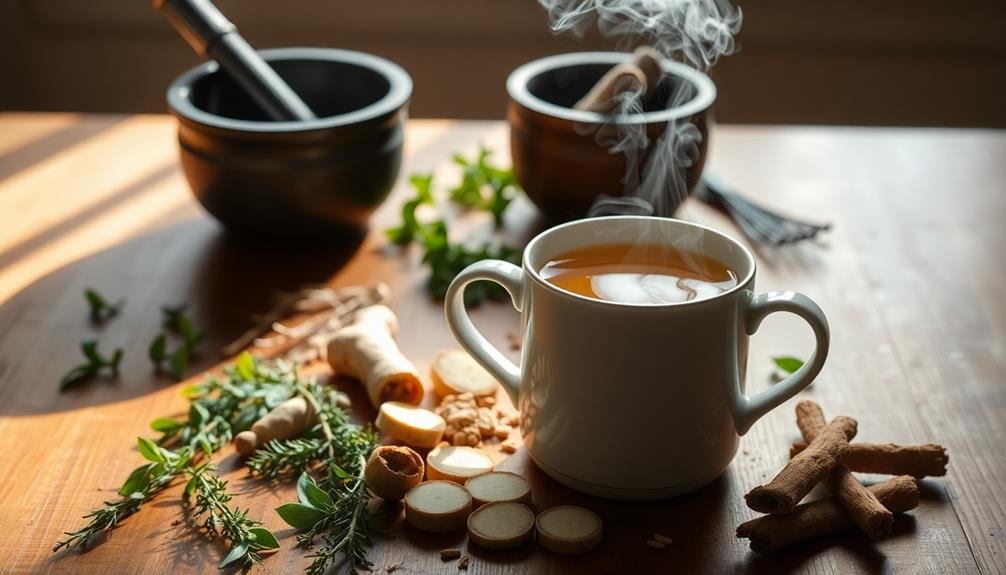
Now that you've gathered your key ingredients, it's time to blend them into a potent respiratory support tea. Start by measuring out equal parts of dried mullein leaves, thyme, and peppermint. Add a smaller amount of licorice root, as it's quite potent. For every cup of the base blend, include a teaspoon of ginger root and a pinch of cinnamon.
Mix the herbs thoroughly in a large bowl, ensuring even distribution. Store your blend in an airtight container away from direct sunlight to preserve its potency.
When you're ready to brew, use one tablespoon of the mixture per cup of hot water. Steep for 5-7 minutes, then strain.
For maximum benefit, drink this tea 2-3 times daily. You can adjust the ratios to suit your taste preferences, but be cautious not to overdo strong herbs like licorice.
If you're new to herbal teas, start with smaller amounts and gradually increase as your body adjusts. Remember, while this blend can support respiratory health, it's not a substitute for medical treatment. Always consult your healthcare provider, especially if you have existing conditions or are taking medications.
Brewing Methods for Maximum Benefits
To maximize the benefits of your respiratory herbal tea blend, you'll need to take into account three key brewing factors.
First, pay attention to the steeping time and temperature, as these can greatly affect the potency of your brew.
You'll also want to explore the differences between hot and cold brewing methods, and make certain you're using the proper herb-to-water ratio for ideal flavor and effectiveness.
Steeping Time and Temperature
When it comes to extracting the maximum benefits from your respiratory health tea blend, proper steeping time and temperature are essential. Different herbs release their therapeutic compounds at varying rates and temperatures, so it's important to tailor your brewing method accordingly.
For most respiratory herbs, you'll want to use water that's just below boiling point (around 190-200°F or 88-93°C). This temperature helps preserve delicate volatile oils while still extracting beneficial compounds. As for steeping time, it varies depending on the herb:
| Herb | Steeping Time | Temperature |
|---|---|---|
| Thyme | 5-7 minutes | 190°F (88°C) |
| Peppermint | 3-5 minutes | 195°F (91°C) |
| Mullein | 8-10 minutes | 200°F (93°C) |
| Elderberry | 10-15 minutes | 195°F (91°C) |
Hot vs. Cold Brewing
Both hot and cold brewing methods offer unique benefits for your respiratory health tea blend.
Hot brewing is the traditional method, extracting beneficial compounds quickly. You'll steep your herbs in water heated to about 200°F (93°C) for 5-10 minutes. This releases volatile oils and other heat-sensitive compounds that can soothe your respiratory system.
Cold brewing, on the other hand, involves steeping your herbs in cold water for 8-12 hours, typically overnight in the refrigerator. This gentle extraction process preserves more delicate compounds and results in a smoother, less bitter taste. Cold-brewed tea may also retain higher levels of antioxidants.
For respiratory health, consider alternating between hot and cold brewing. Hot tea can provide immediate relief, especially when you're feeling congested. Its warmth and steam can help open airways and thin mucus.
Cold-brewed tea is invigorating and hydrating, making it ideal for daily consumption to support overall respiratory health. You might find that cold brewing works better for herbs with a strong flavor, while hot brewing is preferable for milder blends.
Experiment with both methods to discover which works best for your taste preferences and health needs.
Proper Herb-To-Water Ratio
The proper herb-to-water ratio is vital for extracting maximum benefits from your respiratory health tea blend. To achieve the best balance, use 1 to 2 teaspoons of dried herbs per cup of water. If you're using fresh herbs, double this amount to account for their higher water content.
For a stronger brew, you can increase the herb quantity slightly, but be cautious not to overdo it. Too many herbs can result in a bitter taste and potentially overwhelm your system. Start with the recommended ratio and adjust according to your preference and tolerance.
When brewing a multi-herb blend, maintain the same overall ratio, dividing the total amount among the different herbs. For example, if using three herbs, allocate about 1/3 teaspoon of each per cup of water.
Remember that some herbs are more potent than others. Adjust accordingly by using smaller amounts of strong herbs like peppermint or thyme, and larger quantities of milder herbs such as chamomile or marshmallow root.
Always measure your herbs and water carefully to guarantee consistency in your brews and to maximize the respiratory benefits of your herbal tea blend.
Dosage and Frequency Recommendations
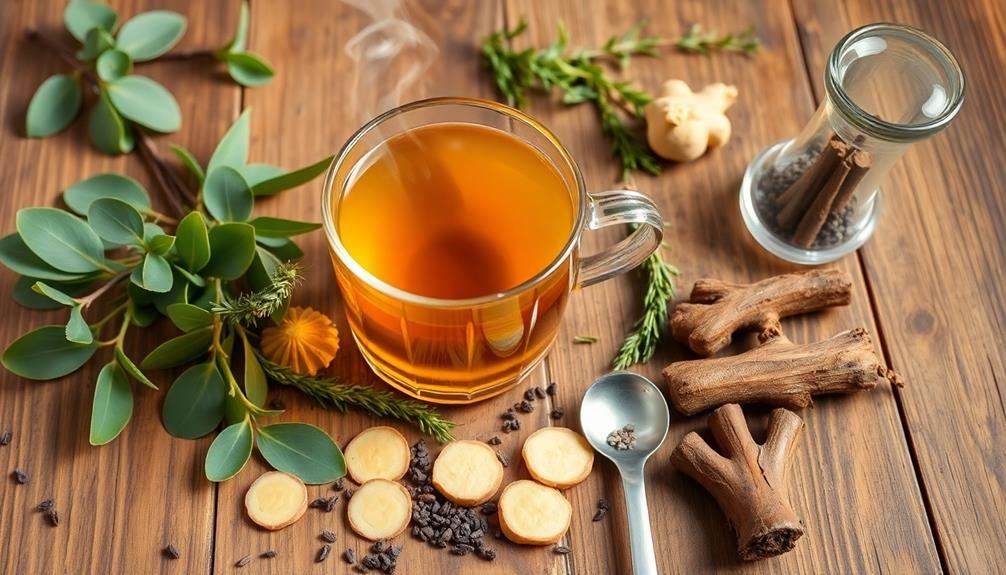
To maximize the benefits of your respiratory herbal tea blend, you'll want to pay attention to proper dosage and frequency.
Start by following the serving size guidelines provided with your blend, typically one to two teaspoons per cup of hot water.
You should limit your daily consumption to three cups and consider timing your intake to coincide with periods when you need the most respiratory support, such as in the morning or before bed.
Serving Size Guidelines
Determining the right serving size for your herbal tea blend is essential for optimal respiratory health benefits. Generally, you'll want to use about 1 to 2 teaspoons of your herbal blend per cup of hot water. For a standard 8-ounce mug, stick to this ratio to guarantee you're not over or under-steeping your tea.
When preparing a larger batch, such as a teapot, use 1 tablespoon of the blend for every 2 cups of water. This guarantees a consistent strength across multiple servings. Remember to steep your tea for 5-10 minutes, depending on your preference for strength and flavor.
For ideal respiratory support, consider these serving guidelines:
- Start with 1 cup in the morning and 1 cup in the evening
- Increase to 3 cups daily during acute respiratory issues
- Don't exceed 4 cups per day without consulting a healthcare professional
- Adjust serving size based on individual tolerance and response
If you're new to herbal teas, start with smaller servings and gradually increase to assess your body's reaction. Always listen to your body and adjust accordingly. If you experience any adverse effects, reduce your intake or consult with a healthcare provider.
Daily Consumption Limits
Moderation is key when it comes to daily consumption limits for your respiratory health tea blend. While herbal teas are generally safe, it's important to follow recommended guidelines to avoid potential side effects or interactions with medications.
For most adults, consuming 2-3 cups of the respiratory health tea blend per day is considered safe and beneficial. Space these servings throughout the day, ideally drinking one cup in the morning and another in the evening. Don't exceed 4 cups daily, as excessive consumption may lead to unwanted effects such as nausea or headaches.
If you're new to herbal teas, start with one cup per day and gradually increase your intake. Pay attention to how your body responds and adjust accordingly.
Pregnant women, nursing mothers, and individuals with pre-existing health conditions should consult their healthcare provider before incorporating this tea blend into their routine.
Remember that herbal teas shouldn't replace prescribed medications or treatments for respiratory issues. Use them as a complementary approach to support your overall respiratory health.
If you experience any adverse reactions, discontinue use and seek medical advice.
Timing of Intake
Proper timing of your respiratory health tea intake can maximize its benefits. For ideal results, consider consuming this herbal blend at specific times throughout the day.
Start your morning with a warm cup to clear your airways and prepare your respiratory system for the day ahead. Sipping the tea mid-afternoon can provide a boost to your immune system and help combat any environmental irritants you've encountered.
Before bed, enjoy a final cup to soothe your throat and promote restful sleep. This nighttime dose can help reduce inflammation and clear mucus, allowing for easier breathing during the night.
Remember to wait at least 30 minutes after meals before drinking the tea to guarantee proper nutrient absorption from your food.
To make the most of your respiratory health tea:
- Drink it consistently at the same times each day
- Allow the tea to steep for 5-7 minutes for full potency
- Consume it while it's still warm for maximum effectiveness
- Adjust timing based on your personal schedule and needs
Potential Side Effects to Consider
While herbal teas are generally considered safe, it's important to be aware of potential side effects that may occur. Some herbs in respiratory blends can interact with medications or cause allergic reactions. For instance, licorice root may increase blood pressure and shouldn't be consumed by those with hypertension. Eucalyptus can cause nausea and vomiting if ingested in large quantities.
You should be cautious if you're pregnant or breastfeeding, as certain herbs can affect hormone levels or be passed through breast milk. Peppermint, for example, may cause heartburn in some individuals.
If you have asthma, be wary of chamomile, which can trigger allergic reactions in people sensitive to ragweed.
Always consult with your healthcare provider before incorporating new herbal teas into your routine, especially if you have pre-existing health conditions or are taking medications. Start with small amounts to test for any adverse reactions.
If you experience any unusual symptoms after drinking herbal tea, discontinue use and seek medical advice. Remember, natural doesn't always mean risk-free, so stay informed and listen to your body.
Combining With Other Wellness Practices
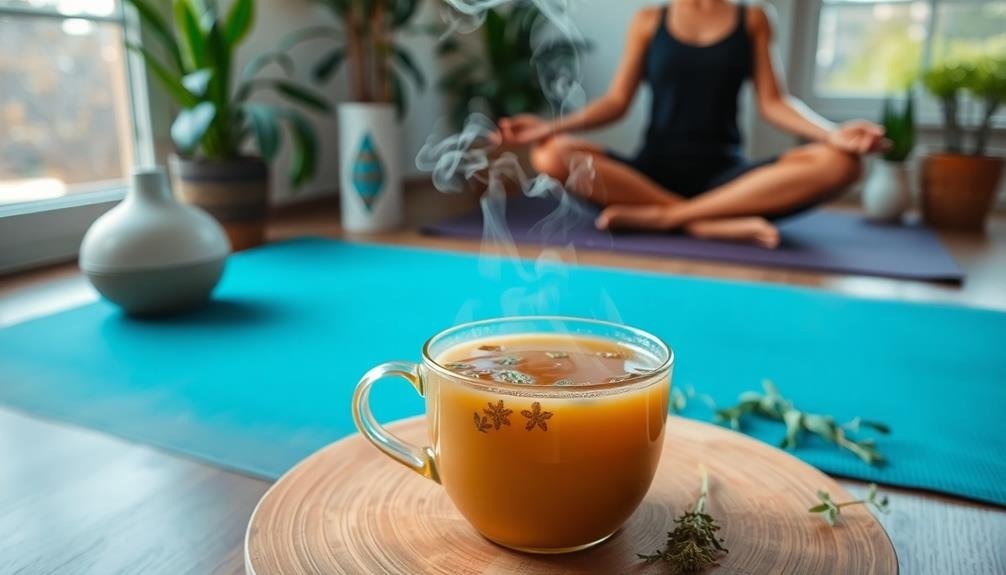
Regularly combining herbal tea consumption with other wellness practices can greatly enhance your overall respiratory health.
Consider incorporating breathing exercises, such as diaphragmatic breathing or pursed-lip breathing, into your daily routine. These techniques can strengthen your lungs and improve oxygen intake.
Additionally, practice good hygiene habits like frequent handwashing and avoiding touching your face to reduce the risk of respiratory infections.
Maintain a clean living environment by regularly dusting, vacuuming, and using air purifiers to minimize airborne irritants.
Engage in moderate exercise to boost your immune system and improve lung capacity.
You can also complement your herbal tea regimen with these wellness practices:
- Practice stress-reduction techniques like meditation or yoga
- Quit smoking and avoid secondhand smoke
- Maintain a balanced diet rich in antioxidants and vitamins
- Stay hydrated by drinking plenty of water throughout the day
Seasonal Variations for Respiratory Support
You'll find that adjusting your herbal tea blends for respiratory health can be beneficial as seasons change.
Consider lighter, cooling blends for spring and summer, while opting for warming, immune-boosting formulas in fall and winter.
However, don't forget to maintain a core set of respiratory-supporting herbs that you can rely on year-round for consistent lung health.
Spring and Summer Blends
As the seasons shift to spring and summer, your respiratory health needs can change. Warmer weather often brings increased pollen counts and air pollution, which can challenge your respiratory system.
To support your lungs during these months, consider adjusting your herbal tea blend.
For spring and summer respiratory support, focus on herbs that offer anti-inflammatory, antihistamine, and cooling properties. Some excellent choices include:
- Peppermint: Helps open airways and provides a cooling effect
- Nettle: Offers natural antihistamine properties to combat allergies
- Elderflower: Supports the immune system and reduces inflammation
- Lemon balm: Calms the respiratory system and aids in relaxation
Combine these herbs in equal parts for a revitalizing and supportive blend. You can also add a touch of local honey to your tea for additional allergy relief.
Remember to steep your blend for 5-7 minutes to extract the full benefits of the herbs.
During outdoor activities, carry a thermos of this cooling blend to stay hydrated and support your respiratory health.
You'll find that this specially crafted spring and summer tea can help you breathe easier and enjoy the season more fully.
Fall and Winter Formulas
When the leaves start to change and temperatures drop, it's time to adjust your respiratory support tea blend for fall and winter. These cooler seasons often bring increased respiratory challenges, so you'll want to focus on warming, immune-boosting herbs.
Start with a base of thyme, known for its powerful antimicrobial properties. Add ginger and cinnamon to provide warmth and improve circulation. Incorporate elderberry for its immune-enhancing effects and ability to fight off colds and flu.
Don't forget echinacea, which can help reduce the severity and duration of respiratory infections. For extra respiratory support, include mullein to soothe irritated airways and licorice root to ease coughs.
A touch of peppermint can help clear congestion and add a revitalizing flavor. If you're dealing with sinus issues, consider adding a small amount of eucalyptus.
Steep this blend for 10-15 minutes to extract maximum benefits. You can enjoy this tea hot or allow it to cool slightly before drinking.
Aim for 2-3 cups daily during fall and winter to maintain ideal respiratory health and ward off seasonal illnesses.
Year-Round Respiratory Support
While seasonal adjustments are important, maintaining a core respiratory support blend year-round is essential for ideal lung health. Your base mix should include herbs known for their long-term benefits to the respiratory system. Incorporate adaptogenic herbs like astragalus and schisandra to boost overall immunity and lung function.
For year-round respiratory support, consider including these key herbs in your daily tea blend:
- Mullein: Soothes irritated airways and promotes lung health
- Thyme: Offers antimicrobial properties and supports respiratory function
- Licorice root: Helps reduce inflammation and soothe throat irritation
- Marshmallow root: Provides a protective coating for mucous membranes
Don't forget to add a small amount of peppermint or spearmint for flavor and to help open airways.
Adjust the ratios of these herbs based on your personal preferences and needs. Remember to steep your tea for at least 10-15 minutes to extract the full benefits of the herbs.
Storing Your Herbal Tea Blend
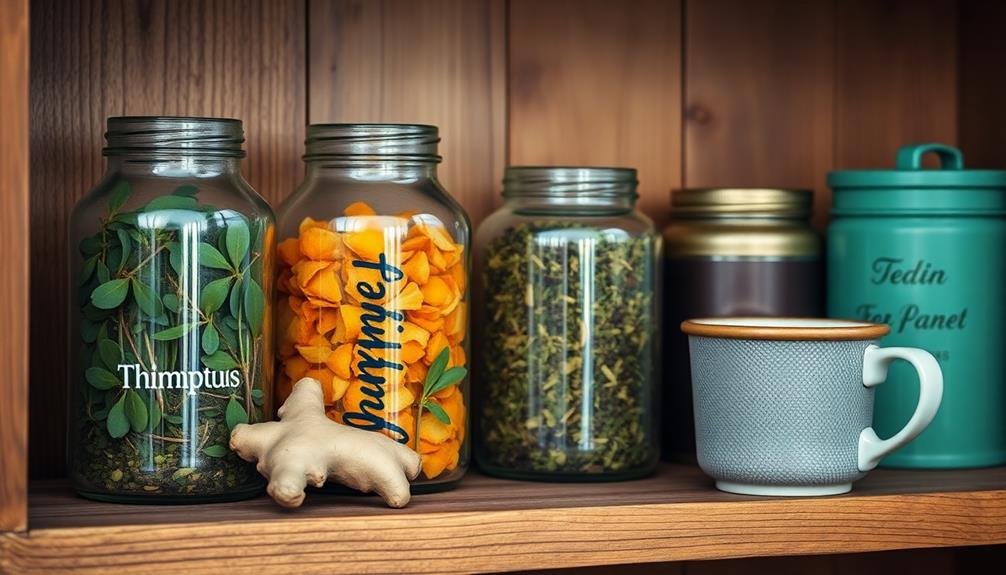
Proper storage is essential for maintaining the potency and freshness of your herbal tea blend. To preserve its quality, keep your blend in an airtight container, away from direct sunlight, heat, and moisture. Glass jars or metal tins with tight-fitting lids are ideal choices. Avoid plastic containers, as they can absorb and transfer odors.
Store your herbal tea blend in a cool, dark place like a pantry or cupboard. If you live in a humid climate, consider adding a food-grade silica gel packet to the container to absorb excess moisture. Label your container with the blend's name and date of preparation to track its freshness.
While properly stored herbal tea blends can last up to a year, it's best to use them within six months for best flavor and potency. Whole herbs and flowers will retain their properties longer than crushed or powdered forms.
If you notice any changes in color, smell, or taste, or if you see signs of mold, discard the blend immediately. By following these storage guidelines, you'll guarantee that your respiratory herbal tea blend remains effective and enjoyable throughout its shelf life.
Enhancing Flavor Without Compromising Benefits
Enhancing the flavor of your respiratory herbal tea blend can make it more enjoyable to drink without compromising its health benefits. You can achieve this by adding natural ingredients that complement the existing herbs and provide additional health benefits. Consider incorporating honey, lemon, or ginger to your blend. These ingredients not only improve taste but also offer their own therapeutic properties for respiratory health.
When adding flavor enhancers, it's essential to maintain balance. Use small amounts to avoid overpowering the primary herbs in your blend. You can experiment with different combinations to find your preferred taste profile.
Some popular flavor-enhancing options include:
- Cinnamon sticks for a warm, spicy note
- Dried orange peel for a citrusy twist
- Peppermint leaves for a cool, invigorating taste
- Star anise for a subtle licorice flavor
Remember that these additions shouldn't replace the core herbs in your respiratory blend. Instead, they should complement and enhance the overall flavor and effectiveness.
Children and Respiratory Health Teas

When it comes to children and respiratory health teas, extra caution is necessary. While many herbal teas can benefit adults, not all are safe or suitable for children. You'll need to carefully consider the ingredients and consult with a pediatrician before offering respiratory health teas to your little ones.
For children over the age of 4, mild herbal teas like chamomile, peppermint, and ginger can be safe options. These herbs can help soothe sore throats and ease congestion. However, you should always serve these teas at a lukewarm temperature and limit consumption to small amounts.
It's essential to avoid teas containing caffeine or potent herbs like echinacea, licorice root, or elderberry for young children. These can cause adverse reactions or interfere with medications. Instead, focus on gentle, child-friendly blends specifically formulated for respiratory health.
Remember to monitor your child's response to any new tea and discontinue use if you notice any adverse reactions.
While herbal teas can be a comforting addition to your child's respiratory health routine, they shouldn't replace proper medical care or prescribed treatments. Always prioritize your child's safety and consult with healthcare professionals for personalized advice.
Alternative Uses for the Blend
The versatility of respiratory health tea blends extends beyond their primary purpose. You can use these herbal concoctions in various ways to enhance your daily routines and overall well-being.
For instance, you might consider adding the blend to your bathwater for a soothing, aromatic soak that can help clear your sinuses and relax your muscles.
Don't limit yourself to just drinking the tea. You can use it as a base for homemade facial steams, allowing the beneficial vapors to directly target your nasal passages and skin.
Another creative application is to use the cooled tea as a natural room spray or linen mist, infusing your living space with its therapeutic scent.
Here are some additional alternative uses for your respiratory health tea blend:
- Use as a gargle for sore throats
- Add to homemade cleaning solutions for a natural, fresh scent
- Incorporate into DIY beauty treatments like face masks or hair rinses
- Use as a flavorful cooking liquid for grains or soups
Sourcing Quality Herbs and Botanicals
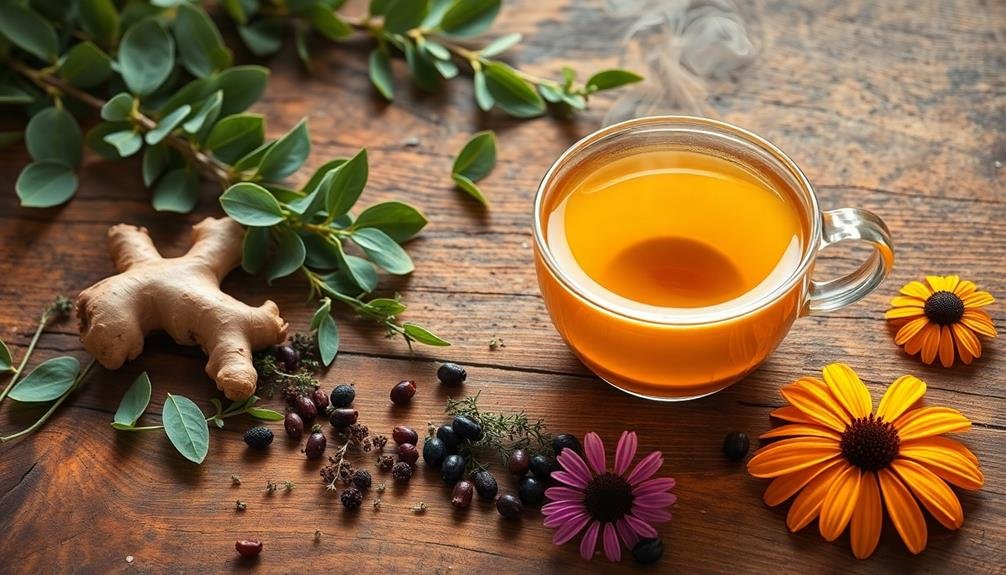
Quality is the cornerstone of an effective herbal tea blend. When sourcing herbs and botanicals for your respiratory health tea, prioritize organic, sustainably harvested options. Look for reputable suppliers who provide detailed information about their sourcing practices and quality control measures.
You'll want to guarantee the herbs are fresh and properly dried to maintain their potency. Check for vibrant colors, strong aromas, and intact leaves or flowers. Avoid herbs that appear discolored, dusty, or have a musty smell, as these may indicate poor quality or improper storage.
Consider purchasing whole herbs rather than pre-ground versions, as they retain their essential oils and active compounds longer. If possible, visit local herb farms or farmers' markets to source fresh, locally grown herbs. This not only supports your community but also allows you to see the herbs firsthand and discuss their cultivation with the growers.
When buying online, read customer reviews and look for third-party certifications that verify the herbs' quality and purity. Don't hesitate to contact the supplier with questions about their sourcing methods or processing techniques.
Frequently Asked Questions
Can Pregnant Women Safely Consume Herbal Teas for Respiratory Health?
You should be cautious when consuming herbal teas during pregnancy. While some may be safe, others can pose risks. Always consult your healthcare provider before trying any herbal teas to guarantee they're safe for you and your baby.
How Long Does It Take to Notice Improvements in Respiratory Health?
You'll typically notice improvements in respiratory health within 1-2 weeks of consistent use. However, it's important to remember that individual results may vary. If you don't see changes, consult your doctor for personalized advice.
Are There Any Drug Interactions With Common Respiratory Medications?
You should always consult your doctor about potential drug interactions with herbal teas. Some herbs can interfere with respiratory medications, affecting their efficacy or causing side effects. It's essential to disclose all supplements you're taking to your healthcare provider.
Can These Herbal Tea Blends Help With Allergies and Sinus Issues?
Yes, herbal tea blends can help with allergies and sinus issues. You'll find relief from congestion and inflammation with ingredients like peppermint, ginger, and eucalyptus. They're natural decongestants that can soothe your sinuses and ease breathing.
Are There Specific Herbal Teas That Can Help With Asthma Symptoms?
Yes, certain herbal teas can help ease asthma symptoms. You'll find relief with ginger, licorice root, and eucalyptus teas. They've got anti-inflammatory properties that may reduce airway constriction. However, always consult your doctor before trying new remedies.
In Summary
You've now got the knowledge to create a powerful herbal tea blend for respiratory health. Remember to choose high-quality ingredients, experiment with brewing methods, and adjust the flavor to your liking. Don't forget to consult a healthcare professional before using these teas, especially for children or if you have existing health conditions. With consistent use and a holistic approach to wellness, you'll be breathing easier in no time.

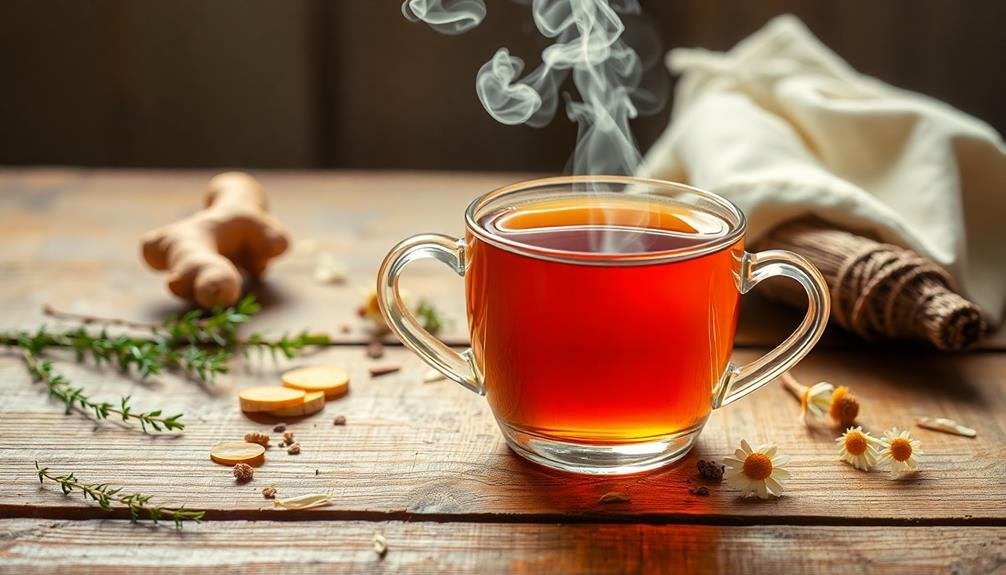


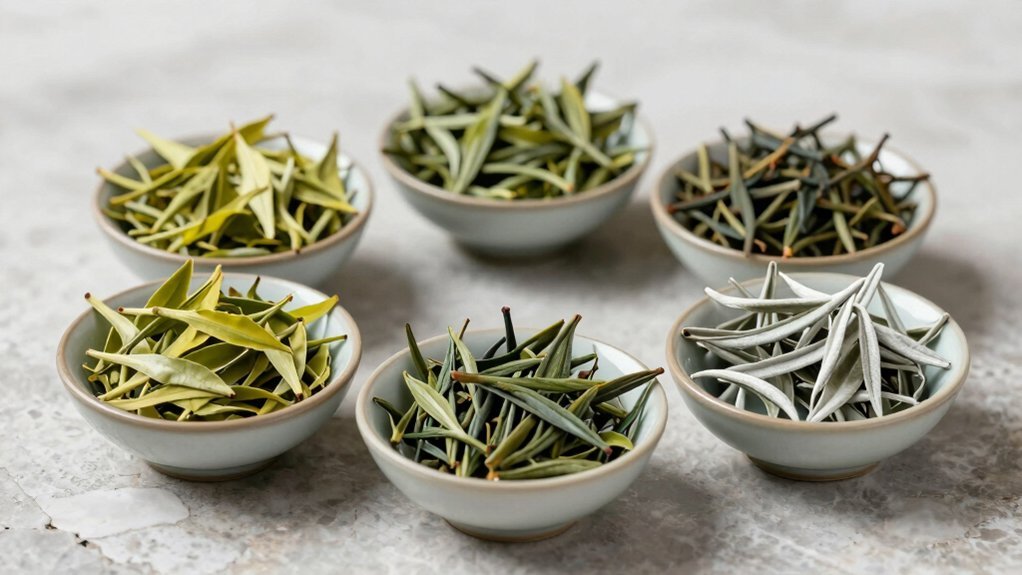
Leave a Reply